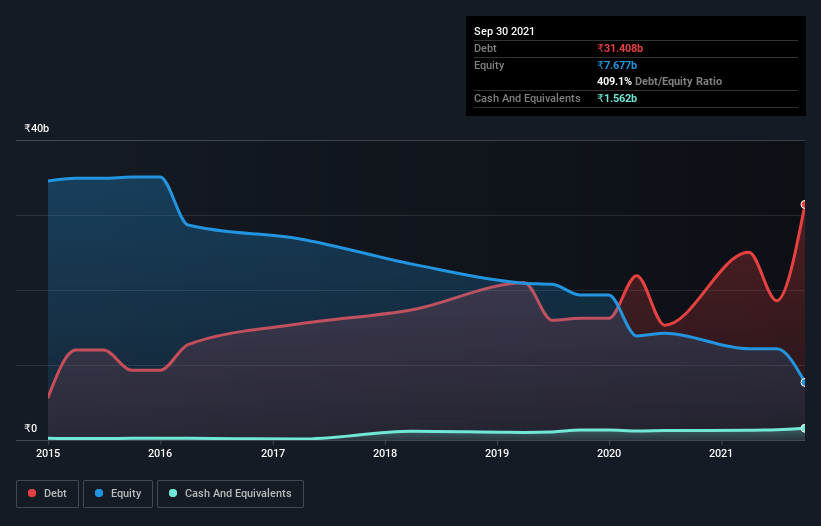
David Iben put it well when he said, 'Volatility is not a risk we care about. What we care about is avoiding the permanent loss of capital.' When we think about how risky a company is, we always like to look at its use of debt, since debt overload can lead to ruin. As with many other companies D B Realty Limited (NSE:DBREALTY) makes use of debt. But the more important question is: how much risk is that debt creating?
Why Does Debt Bring Risk?
Debt and other liabilities become risky for a business when it cannot easily fulfill those obligations, either with free cash flow or by raising capital at an attractive price. If things get really bad, the lenders can take control of the business. However, a more usual (but still expensive) situation is where a company must dilute shareholders at a cheap share price simply to get debt under control. By replacing dilution, though, debt can be an extremely good tool for businesses that need capital to invest in growth at high rates of return. The first step when considering a company's debt levels is to consider its cash and debt together.
View our latest analysis for D B Realty
How Much Debt Does D B Realty Carry?
The image below, which you can click on for greater detail, shows that at September 2021 D B Realty had debt of ₹31.4b, up from ₹15.3b in one year. However, because it has a cash reserve of ₹1.56b, its net debt is less, at about ₹29.8b.

How Strong Is D B Realty's Balance Sheet?
We can see from the most recent balance sheet that D B Realty had liabilities of ₹50.3b falling due within a year, and liabilities of ₹12.7b due beyond that. On the other hand, it had cash of ₹1.56b and ₹11.1b worth of receivables due within a year. So its liabilities outweigh the sum of its cash and (near-term) receivables by ₹50.4b.
The deficiency here weighs heavily on the ₹11.0b company itself, as if a child were struggling under the weight of an enormous back-pack full of books, his sports gear, and a trumpet. So we'd watch its balance sheet closely, without a doubt. After all, D B Realty would likely require a major re-capitalisation if it had to pay its creditors today. There's no doubt that we learn most about debt from the balance sheet. But it is D B Realty's earnings that will influence how the balance sheet holds up in the future. So when considering debt, it's definitely worth looking at the earnings trend. Click here for an interactive snapshot.
In the last year D B Realty had a loss before interest and tax, and actually shrunk its revenue by 8.7%, to ₹313m. We would much prefer see growth.
Caveat Emptor
Over the last twelve months D B Realty produced an earnings before interest and tax (EBIT) loss. To be specific the EBIT loss came in at ₹997m. If you consider the significant liabilities mentioned above, we are extremely wary of this investment. That said, it is possible that the company will turn its fortunes around. Nevertheless, we would not bet on it given that it lost ₹4.4b in just last twelve months, and it doesn't have much by way of liquid assets. So we think this stock is quite risky. We'd prefer to pass. The balance sheet is clearly the area to focus on when you are analysing debt. However, not all investment risk resides within the balance sheet - far from it. For instance, we've identified 3 warning signs for D B Realty (1 can't be ignored) you should be aware of.
At the end of the day, it's often better to focus on companies that are free from net debt. You can access our special list of such companies (all with a track record of profit growth). It's free.
New: Manage All Your Stock Portfolios in One Place
We've created the ultimate portfolio companion for stock investors, and it's free.
• Connect an unlimited number of Portfolios and see your total in one currency
• Be alerted to new Warning Signs or Risks via email or mobile
• Track the Fair Value of your stocks
Have feedback on this article? Concerned about the content? Get in touch with us directly. Alternatively, email editorial-team (at) simplywallst.com.
This article by Simply Wall St is general in nature. We provide commentary based on historical data and analyst forecasts only using an unbiased methodology and our articles are not intended to be financial advice. It does not constitute a recommendation to buy or sell any stock, and does not take account of your objectives, or your financial situation. We aim to bring you long-term focused analysis driven by fundamental data. Note that our analysis may not factor in the latest price-sensitive company announcements or qualitative material. Simply Wall St has no position in any stocks mentioned.
About NSEI:DBREALTY
Valor Estate
Operates as a real estate construction and development company in India.
Adequate balance sheet minimal.
Similar Companies
Market Insights
Community Narratives




